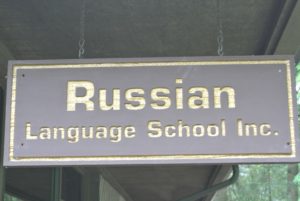Recently I learned that a boy who has been attending Russian school with my daughter for the past year and a half will enter kindergarten next school year and not return to Russian School. I was disappointed because my daughter and he are friends, but I was also sad. I was sorry that he wouldn’t be coming back. Emotional involvement in someone else’s decision is considered a poor life choice by Americans. But in Russia, it’s how we keep our community.
This phenomenon expressed itself a couple days later in a conversation with his grandfather, who was looking at the summer schedule at the Russian school. The entire conversation took place in Russian.
“Is Polina coming to summer school?”
“I don’t know yet. We have to figure out the schedule.”
“I don’t know if [K] is coming back.”
“His nanny told me he will be starting kindergarten in the fall and wouldn’t be coming back.”
“You know, I don’t make the decisions.”
“I understand.”
Pause.
Me: “On stanet Amerikantsem.” (“He will become an American.”)
Grandfather: “Vsye pravilno.” (“That’s how it should be.”)
[pullquote] I’m married to an American. I speak English better than Russian. But I would be really sad if my daughter didn’t know her roots. I would be really said if she became just another face in the masses.[/pullquote]
My heart sank, and knowing him, despite his rhetoric, I think his did too. I’ve lived in America (or the United States, as the other Americans in our hemisphere remind us) more years than I’ve lived anywhere else. I’m married to an American. I speak English better than Russian. But I would be really sad if my daughter didn’t know her roots. I would be really said if she became just another face in the masses.
And this is perhaps my main motivator in sending my daughter to Russian school. I’ve experienced how easy it is for the language to slip away. I would argue that it is difficult to sustain a culture without language. When people find out that I speak Russian, they sometimes respond with enthusiasm that their grandparents came from Russia, or Germany, or another European country or a combination thereof. But what is left of that heritage now, I wonder, except an emotional connection that is not tied to anything. Not only do people not speak the language, many have never visited their land of their not-too-distant ancestors.
In a couple generations, European immigrants have, for the most part, been whitewashed. Almost everyone has heard about or witnessed prejudice against Jews, Catholics, and Mormons (to name a few), but it wasn’t too long ago that an Episcopalian family expressed concern if their son or daughter married a Presbyterian. It’s hard to believe now that at one time there were violent differences between Quakers and Congregationalists. Now everything is a blur.
I’m not saying we should rekindle prejudice against any particular religion or group of people. Far from it. I’m just saying we should know who we are and where we come from.
Perhaps I feel this more keenly because I came to the US when I was almost six years old. I was raised in a Russian speaking household, even though my mother wasn’t around much. At some point I began tipping more towards being American than Russian. My grandfather started calling me American. It really bothered me, because I didn’t really feel fully “American” either.
In the eighties, I waved the American flag like everyone else. It wasn’t until I saw other immigrants not just preserving, but boasting about their identity that I fell back on my own. I needed it. I felt disconnected without it.
After college, I lived in Russia for three years. It was an eye opener. I saw pieces of myself reflected back to me in other people. There were tangible similarities. As an only child, it was the closest thing I felt to having a sibling. I remember a woman in a fur coat helping a drunk man- a stranger- off the floor of a subway train that was in motion. Here, people would defer to authorities. There, people address each other as “man” and “woman,” which sounds crude, but at least strangers are talking to each other. Probably the major difference is the amount of advice you receive from Russians. It’s our way of connecting and shows we give a damn. Here, people apologize before giving advice. Advice without an explanation can be interpreted as rude.
Americans who’ve been to a Russian home talk about the warmth of that experience. That is what I connect with even now, and what I miss in “American” culture, which usually meets at an eating establishment.
Russians have a national culture that is easier to understand because there are a lot of cultural similarities among people. It is not as difficult to figure out as American culture, where there is a lot more diversity and finding your tribe is trickier.
Russia isn’t perfect, and there are things I disagree with, but there is something about the culture that holds still and true, for me at least. Some pride, with a dash of idealism and nostalgia, that connects me to my ancestors.
So that is why I send my daughter to the Russian Language School. So she can have some kind of root system.
And so that we can speak Russian together and pass this bit of our heritage to the next generation.
.
